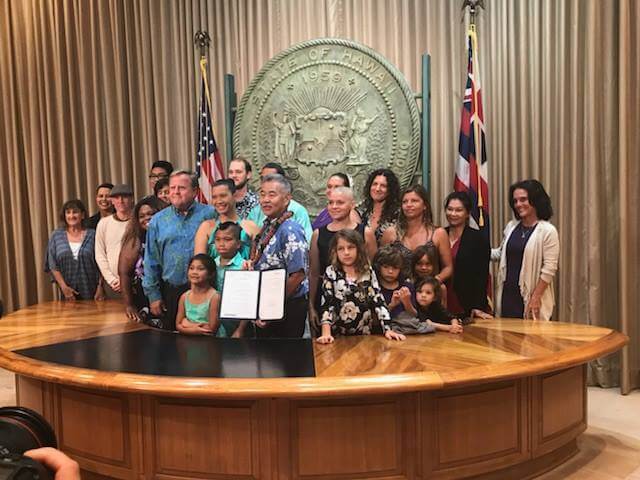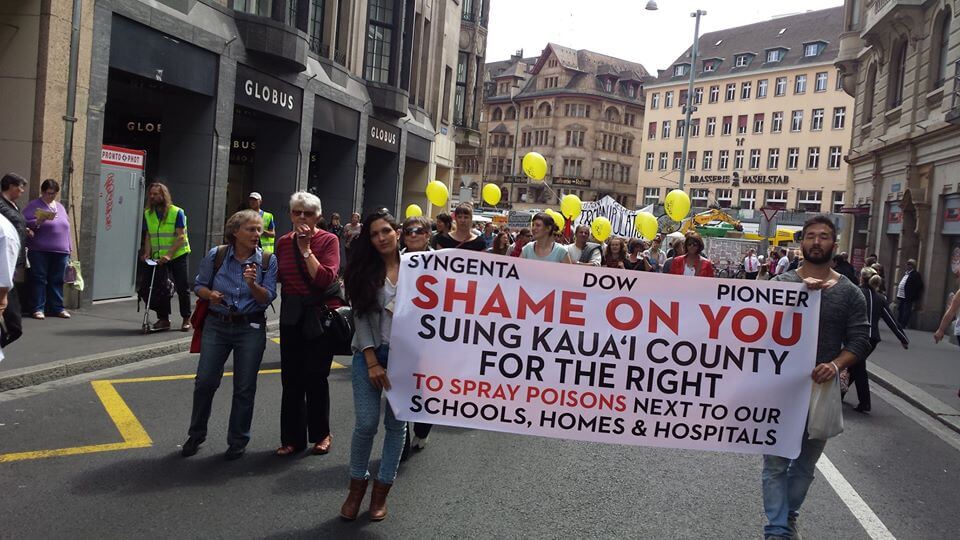MultiWatch Basel, 14. Juni 2018
Gestern 13. Juni setzte David Ige, Gouverneur des State of Hawaii, das neue Gesetz Senate Bill 3095 in Kraft. Deses Gesetz verbietet den Einsatz des Pestizids Chlorpyrifos und verlangt, dass im Abstand von 100 Fuss zu Schulhäusern während der Schulstunden keine Pestizide ausgebracht werden dürfen. Die Agrochemiefirmen müssen regelmässig darüber berichten, wann und wo welche Pestizide ausgebracht werden.

Dieser Entscheid des Parlaments und des Gouverneurs des US-Staats Hawaii ist ein Erfolg für die lokalen Bewegungen der Anwohner*innen. Das Parlament der nördlichen Hawaii-Insel Kawai hatte schon 2014 ein solches Gesetz beschlossen, das Schutzzonen und Informationspflicht für den Pestizideinsatz verlangte. Syngenta und die anderen Pestizid-Multis ergriffen daraufhin gegen diesen Beschluss des Kauai-Parlaments Rekurs. Die Gerichte beschlossen dann, dass das Lokalparlament von Kauai kein Recht habe, ein solches Gesetz zum Schutze ihrer Bürgerinnen und Bürger zu erlassen. Die sozialen Bewegungen auf Hawaii eskalierten darauf ihren Kampf auf den ganzen Staat Hawaii. Das Resultat ist jetzt diese Senate Bill 3095.
Ausweitung des Widerstands gegen Agrochemie-Multis aufgrund der Rekurse
Die Rekurse der Agrochemie-Multis gegen die Beschlüsse des Parlaments von Kauai haben also dank der Widerstandsbewegung eine für die Multis kontraproduktive Wirkung gezeitigt. Der Widerstand gegen Syngenta, Bayer und DowDuPont hat sich jetzt auf den ganzen Staat Hawaii ausgeweitet. Die Schutzzonen und Informationspflicht gilt nun nicht nur für die kleine Insel Kauai mit 60'000 Bewohner/Innen sondern für den ganzen Staat Hawaii mit 1,4 Mio. Einwohner*innen.

MultiWatch: Unterstützung der Bewegung gegen die Pestizide auf Kauai
Wir von MultiWatch sind stolz, mit unserer internationalen Solidarität die Bewegung gegen die Pestizide auf Kauai unterstützt zu haben. Im April 2015 besuchte eine Delegation aus Kauai unter der Leitung des Lokalpolitikers Gary Hooser auf unsere Einladung Basel, um am Hauptsitzstandort von Syngenta über ihren Konflikt mit dem Agromulti zu informieren. Gary Hooser sprach an der Generalversammlung von Syngenta 2015 mit der Syngenta-Aktie von MultiWatch zu den Aktionären. Basler Grossrätinnen und Grossräte empfingen Gary Hooser im Basler Rathaus. Ein Vorstoss der Linksparteien, den Fall Syngenta auf Kauai im Grossen Rat zu thematisieren, scheiterte nur knapp aan der bürgerlichen Mehrheit im Grossen Rat. Der erste „March against Monsanto & Syngenta“ trug die Forderungen aus Kauai vor den Syngenta-Hauptsitz. Dem Basler Regierungspräsidenten übergaben wir im Mai 2015 mehr als 3000 Unterschriften aus Hawaii, die die Regierung aufforderten, sich dafür einzusetzen, dass die Einwohner*Innen von Kauai denselben Schutz gegen Pestizide geniessen sollten wie diejenigen des Hauptsitzkantons Basel-Stadt. Gary Hooser und Fern Rosenstiel besuchten Basel seither wieder und betonten die Wichtigkeit unserer Solidarität. Im „Schwarzbuch Syngenta“ dokumentierten wir den Fall Syngenta auf Kauai.
Nachdem die Regierung offensichtlich aus den 3000 Unterschriften aus Kauai nichts gemacht hat, habe wir einen Offenen Brief an Regierung und Parlament des Hauptsitzkantons Basel Stadt lanciert. Bereits 700 Menschen haben bisher diesen Brief unterschrieben, der eine andere Politik gegenüber den Konzernen verlangt und konkrete Massnahmen vorschlägt. Dieser Brief kann immer noch unterschrieben werden auf https://act.campax.org/petitio…/nicht-in-unserem-namen-basel
Offizielle Pressemitteilung des Staats Hawaii
Hawai‘i does what EPA failed to do: first U.S. ban on chlorpyrifos enacted into law
For immediate release: June 13, 2018
Honolulu, Hawai‘i: Hawai'i made history today when Governor David Ige, watched by representatives of the community from across the islands, signed into law Senate Bill 3095, banning all uses of chlorpyrifos, a neurotoxin that has been banned for home use for over 10 years because of its known impacts on the developing brains of children. This law also mandates 100 foot no-spray buffer zones around schools to protect children from open air spraying of Restricted Use Pesticides (RUPs) during school hours. Chemical companies will have to report regularly on the RUPs they sprayed, when and where they sprayed, and in what quantities. This will allow impacted communities to access information about what they are being exposed to, and regulators to make informed decisions about protecting public health, the environment and endangered ecosystems.
This new law is the culmination of nearly six years of grassroots organizing by small, rural communities facing daily pesticide exposure, fighting lawsuits and millions spent on lobbying by the chemical companies. A coalition of families, teachers, scientists, health professionals, and advocates from the Hawai'i Alliance for Progressive Action (H.A.P.A.), Hawai'i Center for Food Safety, Hawai‘i SEED, and Pesticide Action Network worked for years to push forward this legislation to protect our keiki, despite millions spent by the agrochemical industry to thwart the democratic process. For the first time in the United States, this bill said NO to chlorpyrifos, a pesticide that can trace its origin to nerve agents developed by the Nazis in World War II.
“As a mother who agonized about the dangers of sending my children to a school next to Monsanto’s fields where RUPs were sprayed regularly, I am so grateful to see this bill become law,” said Molokai lawyer and activist, Keani Rawlins-Fernandez,
“This law is our message to the EPA and to the chemical companies that we will no longer tolerate being ground zero for the testing of toxic pesticides that are damaging our children’s health and poisoning our environment,” said Gary Hooser, former Majority Leader of the Hawai'i Senate, and founder of the Hawaii Alliance for Progressive Action. Hooser, who lives on Kauai, led the “Protect our Keiki” coalition of diverse residents from across the islands through the complex political process that resulted in this much needed compromise law to regulate how highly toxic chemicals like chlorpyrifos are unleashed on the community.
“Hawaii’s efforts have set a precedent, and we hope this will pave the way for other states that are looking to enact similar legislation,” said Leslee Matthews from Pesticide Action Network
A win that will reverberate across the nation
“This is Hawai'i fighting back against the disrespect for science and public health—and winning! In the era of Trump, states must lead,” added Hooser.
Background
Large agrochemical operations operate year round and take advantage of Hawaii’s three growing seasons. Consequently, there are areas where communities are exposed daily to the impacts of open spraying of Restricted Use Pesticides. Local county ordinances on each island to regulate pesticide use and protect public health were met with lawsuits by the chemical companies. The 9th Circuit court ruled in favor of the chemical companies and invalidated county regulations, arguing that only the state had the authority to pass such laws.
Hawaii sets precedent for other states
Today the state exercised that responsibility to protect its citizens. Governor David Ige’s decision to sign the bill into law was an affirmation of how government is supposed to work when it listens to what the people need. Hawai`i did what the Environmental Protection Agency failed to do. It responded to the abundant data and studies that point to the adverse effects of R.U.P. Scientists, including some who had previously worked for the E.P.A. weighed in. Physicians weighed in, calling for a ban based on clear health impacts that they were seeing. Mothers, in tears about the terrible risk to their children’s health, weighed in. It was time to act. And Hawai`i did, with passage and enactment of SB3095 into law.
For more information/interviews:
Anne Frederick, Executive Director, H.A.P.A. | 808-212-9616 x1
Dawn Morais Webster: dmoraiswebster@gmail.com | 808-383-7581
Paul Towers: ptowers@panna.org | 916-216-1082



